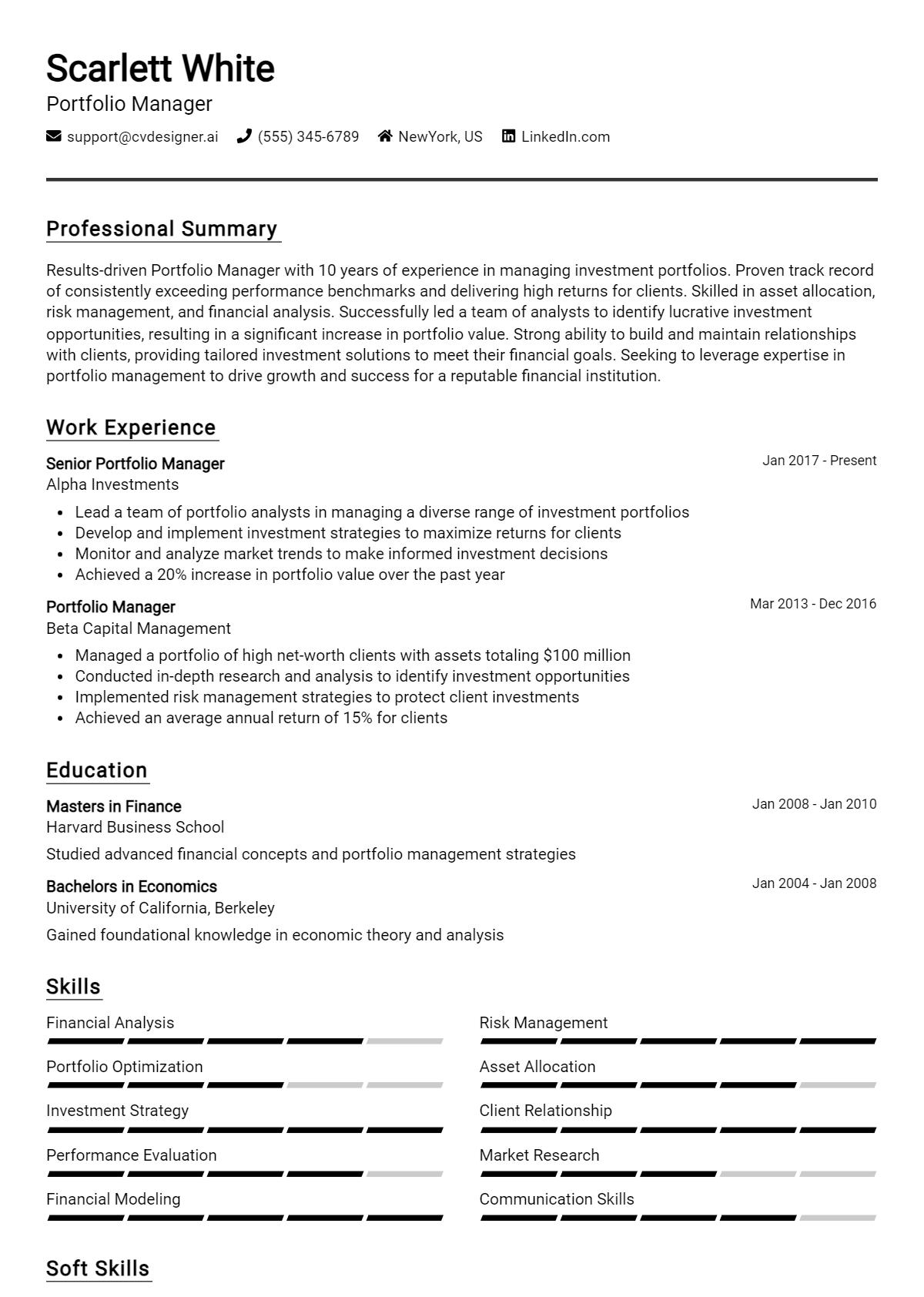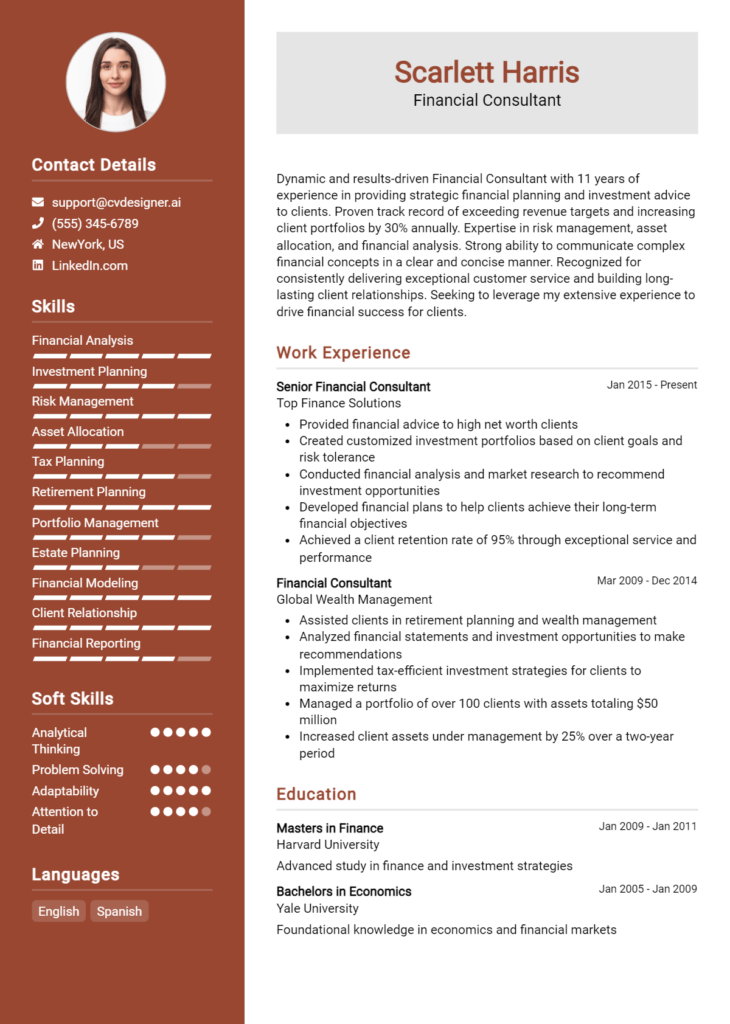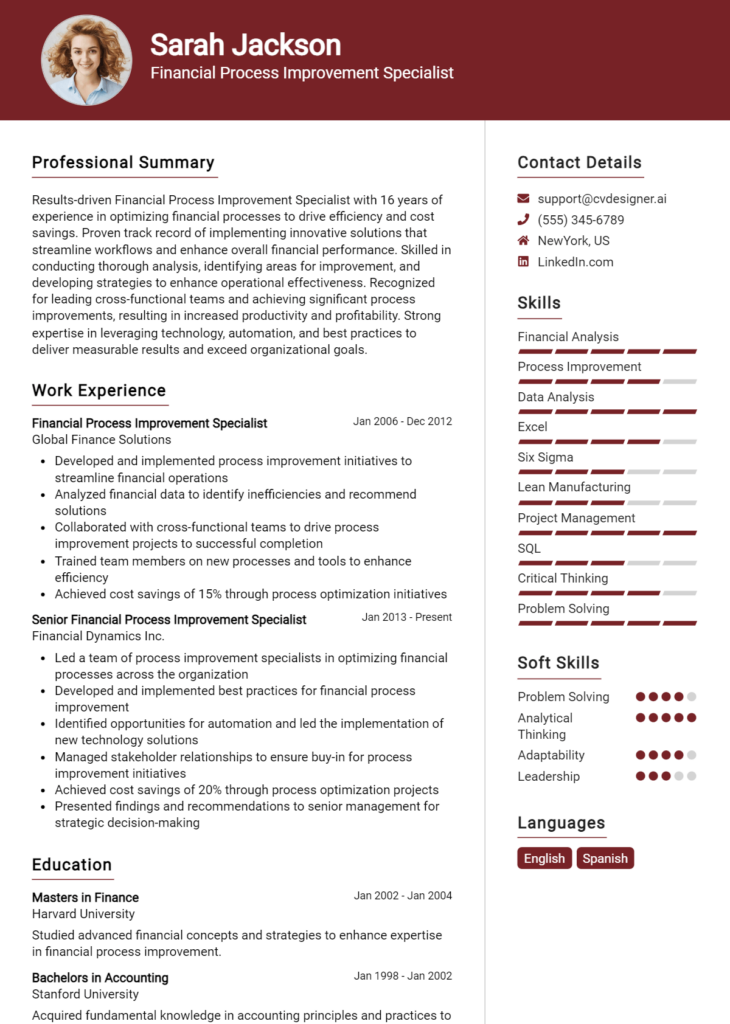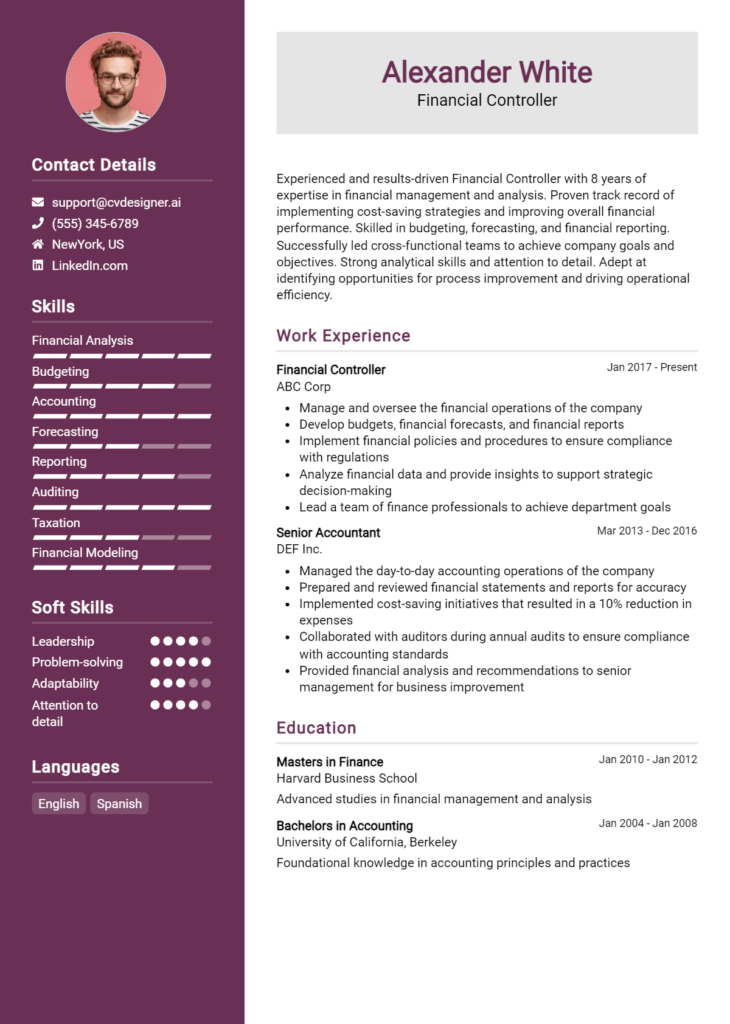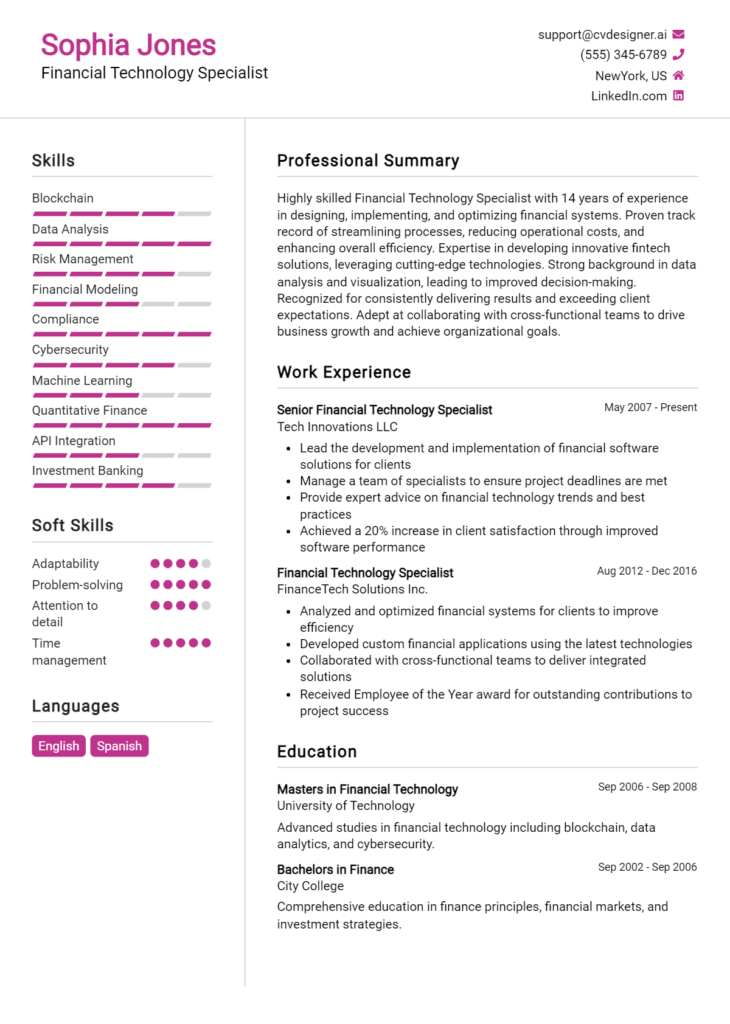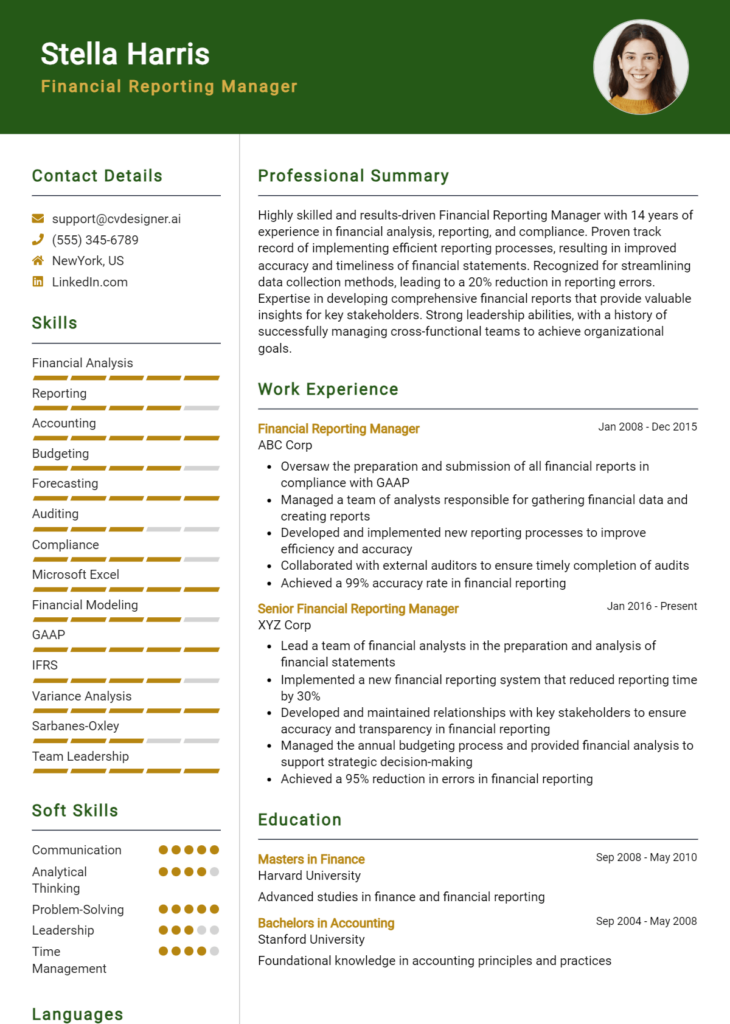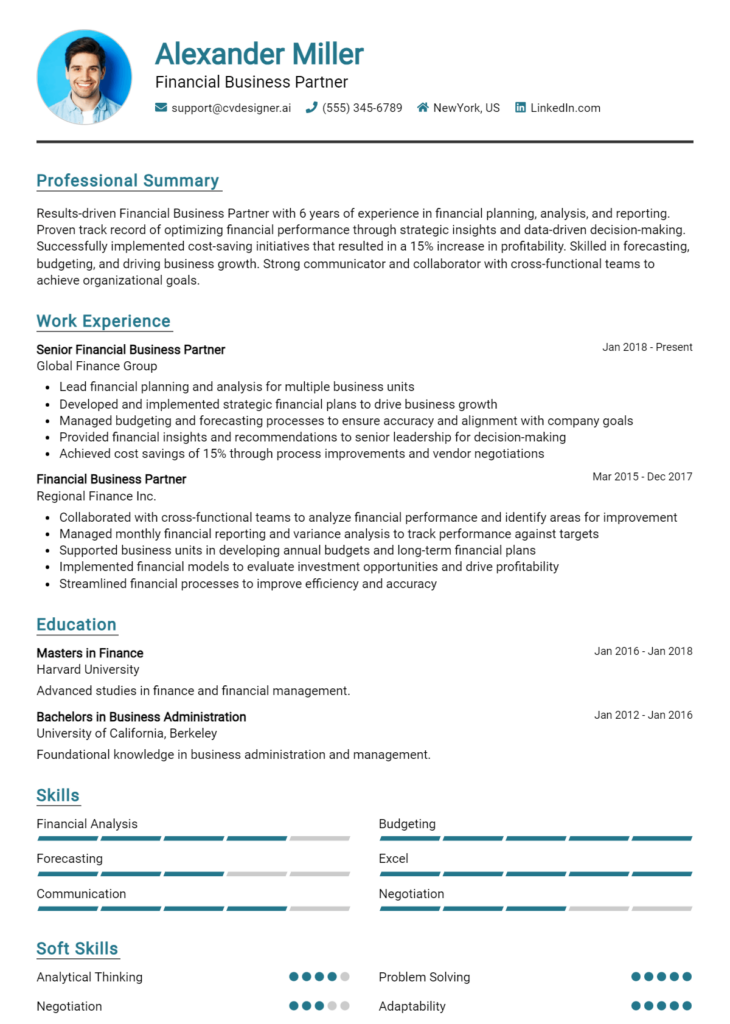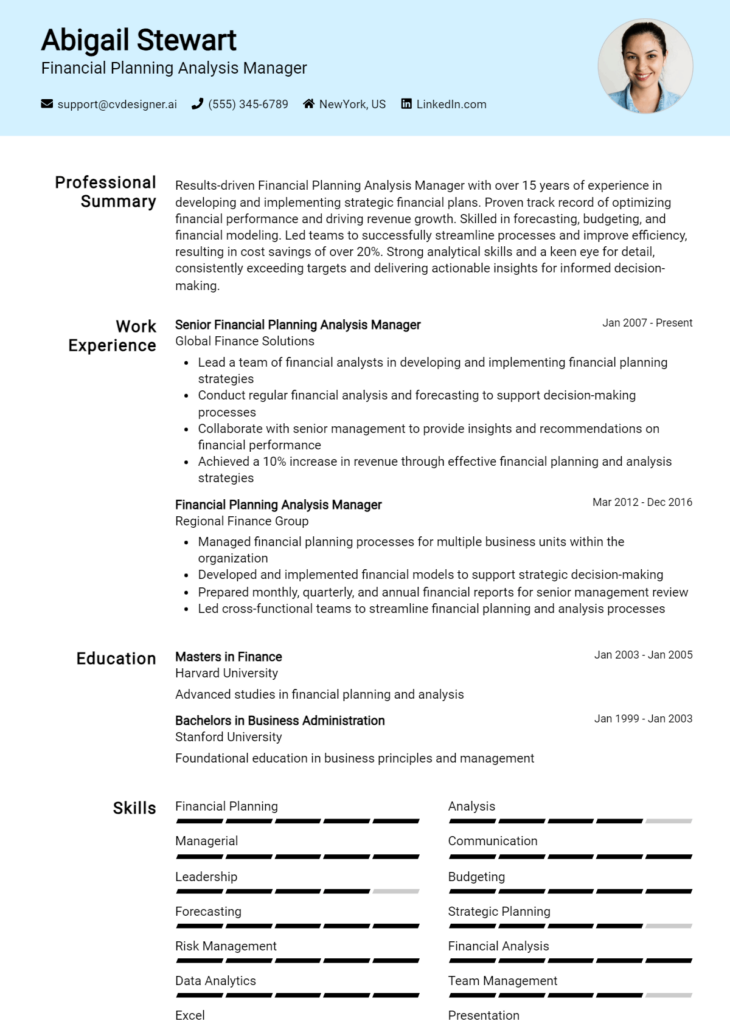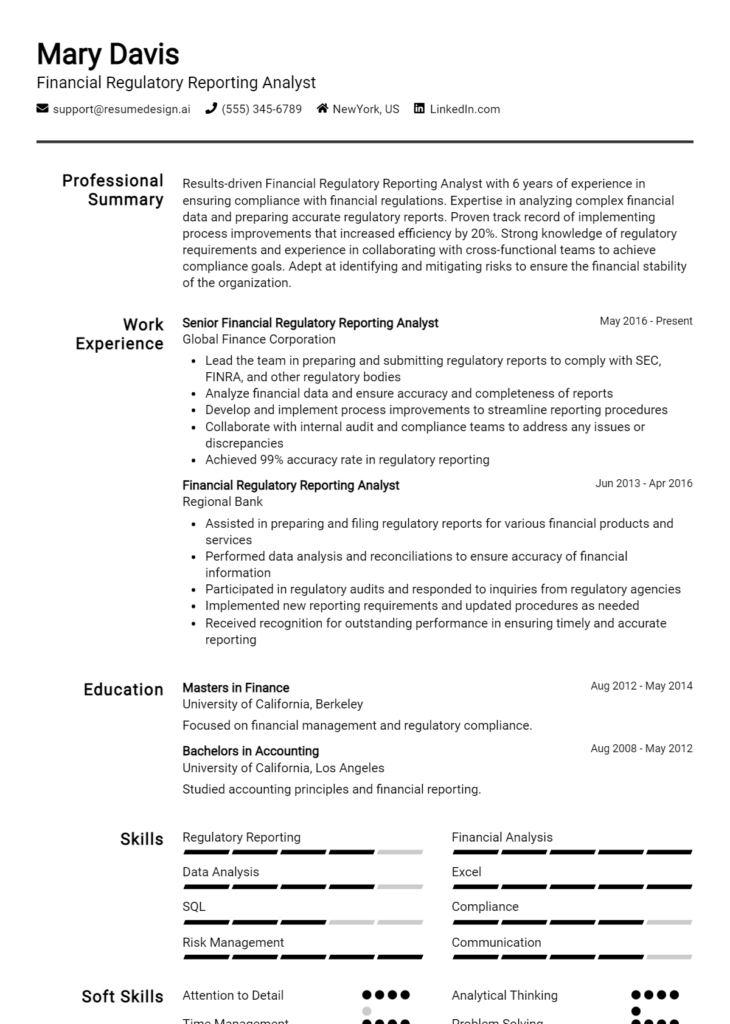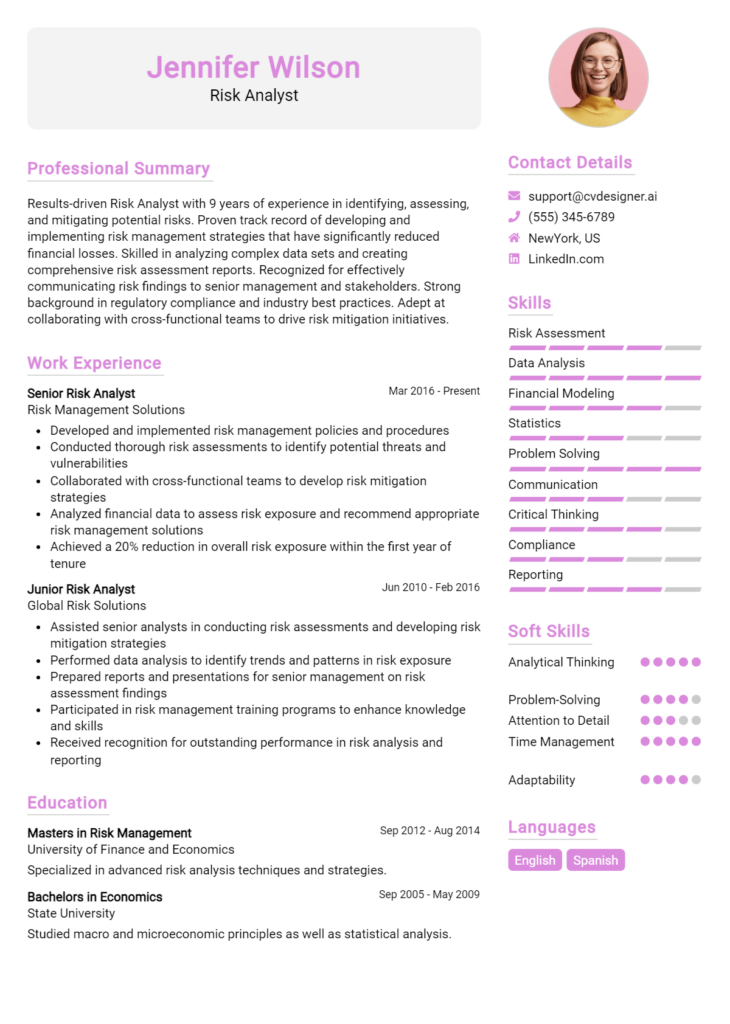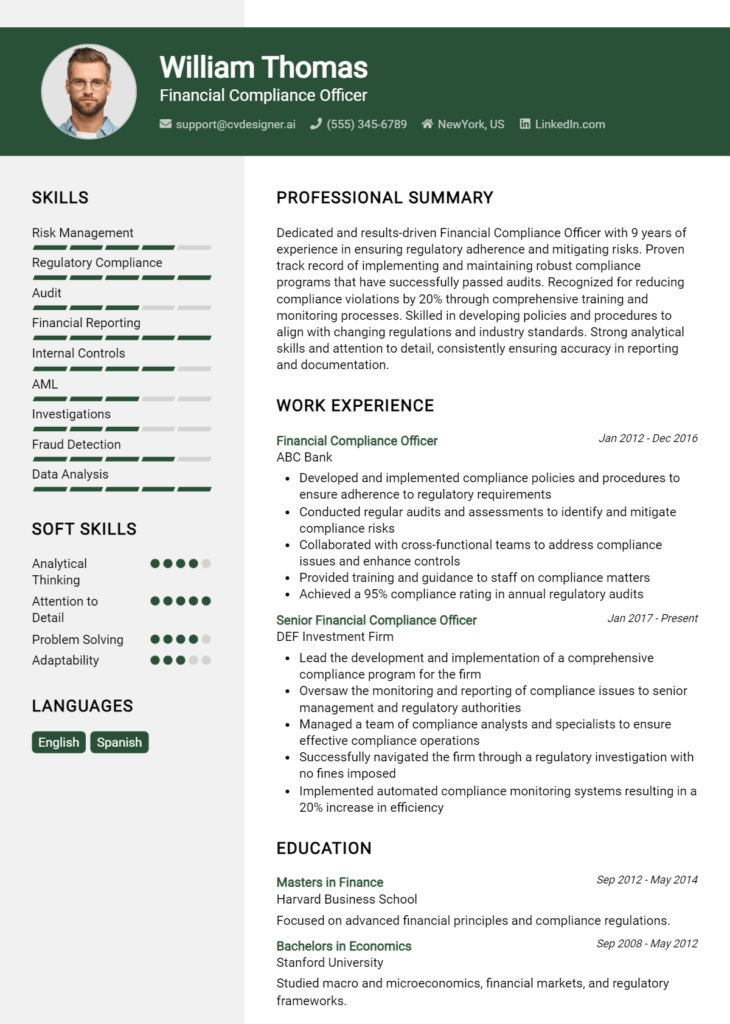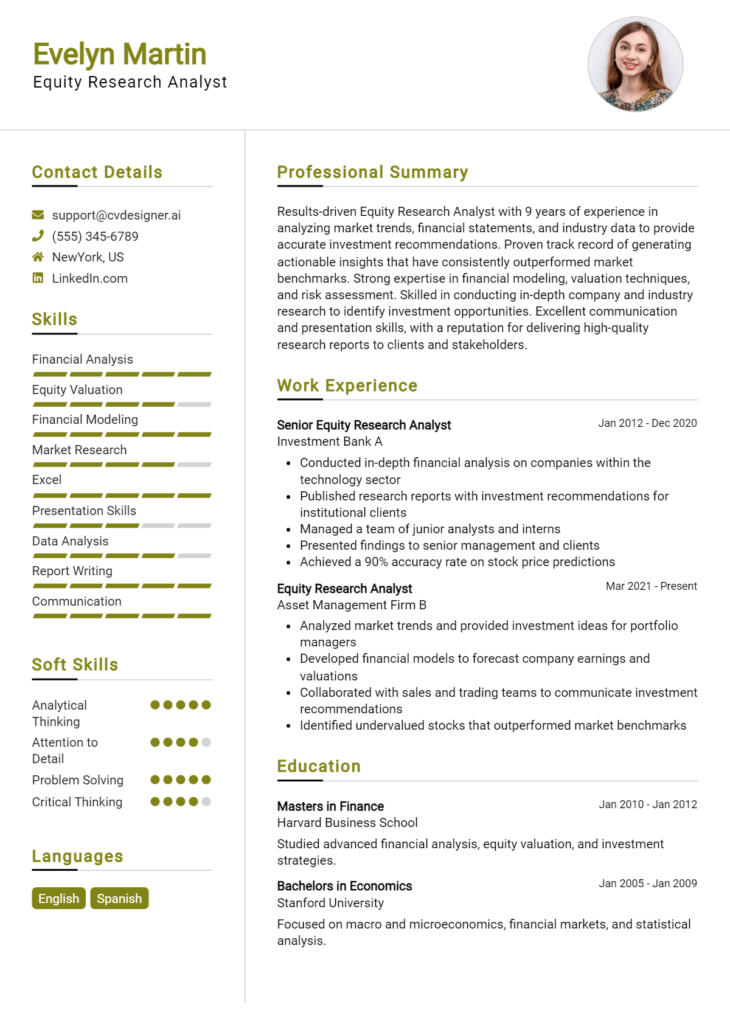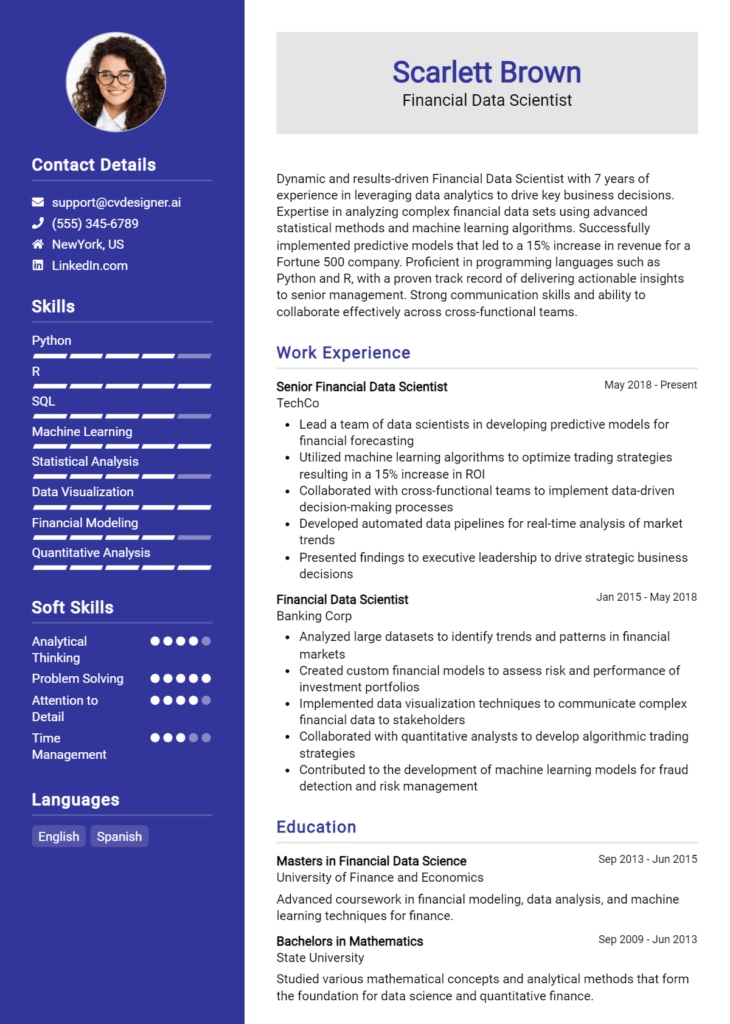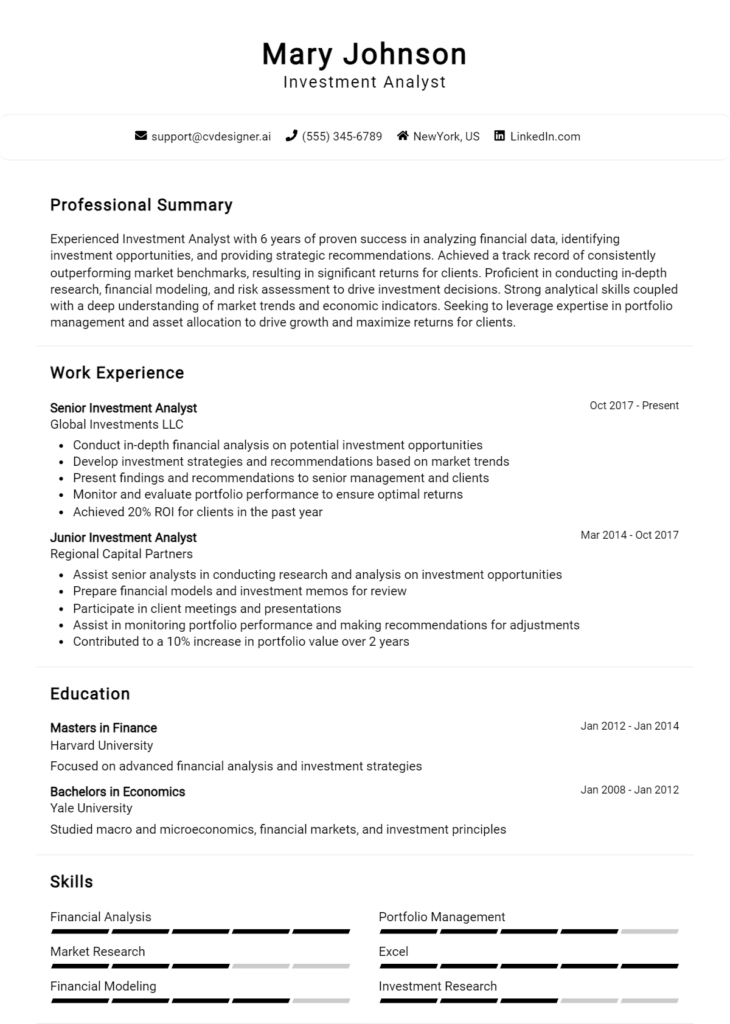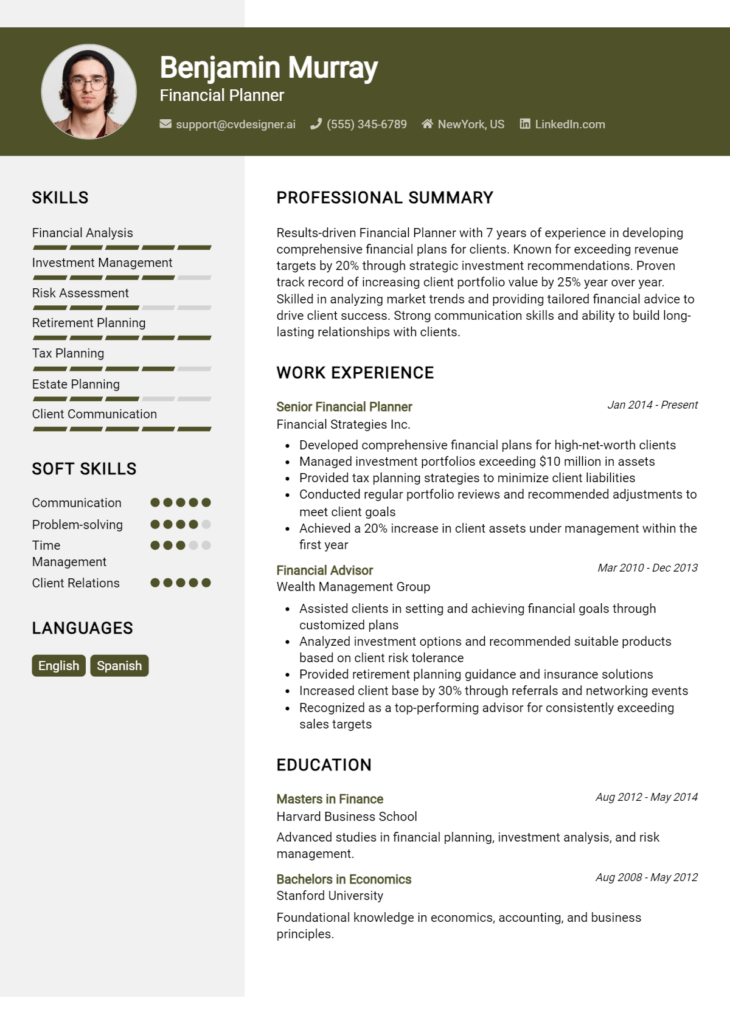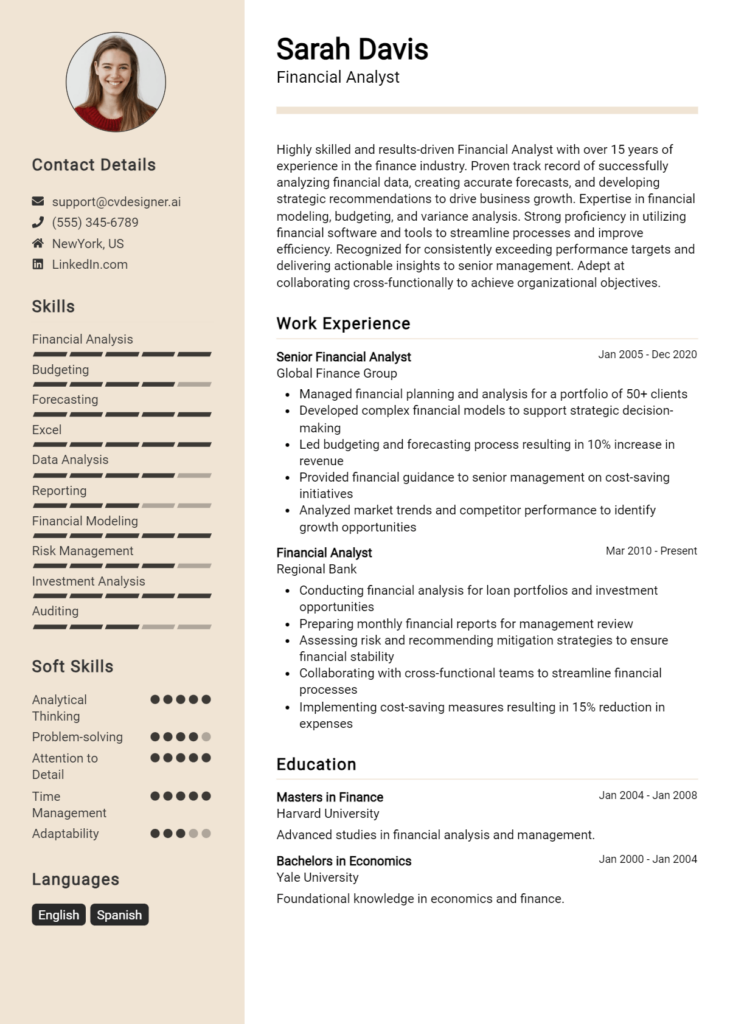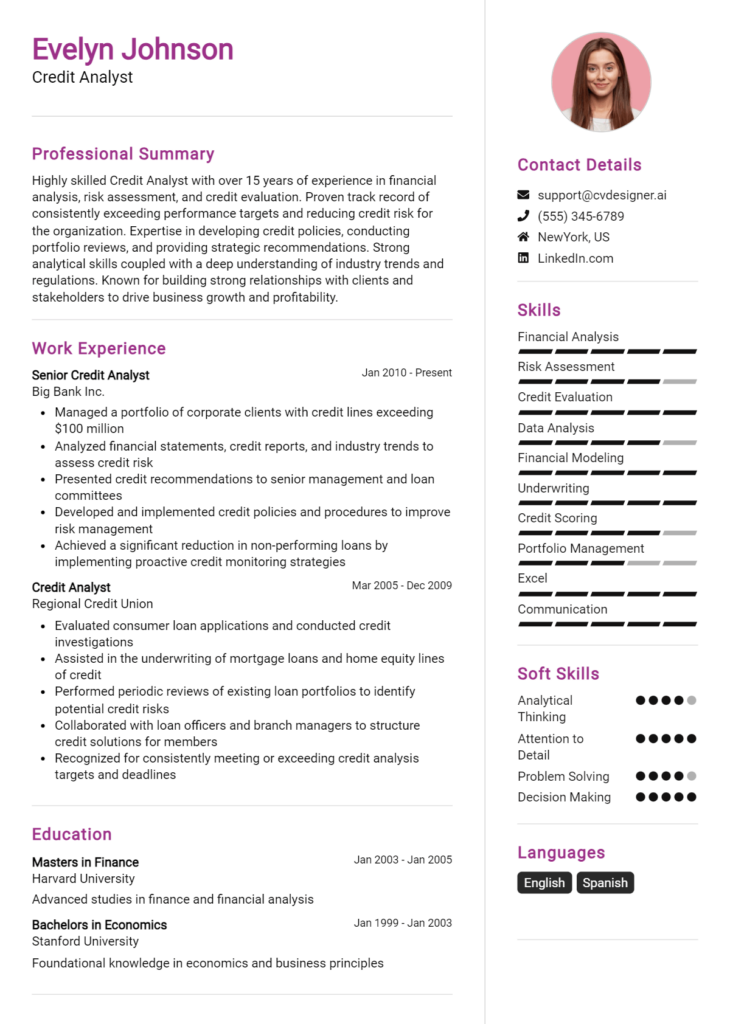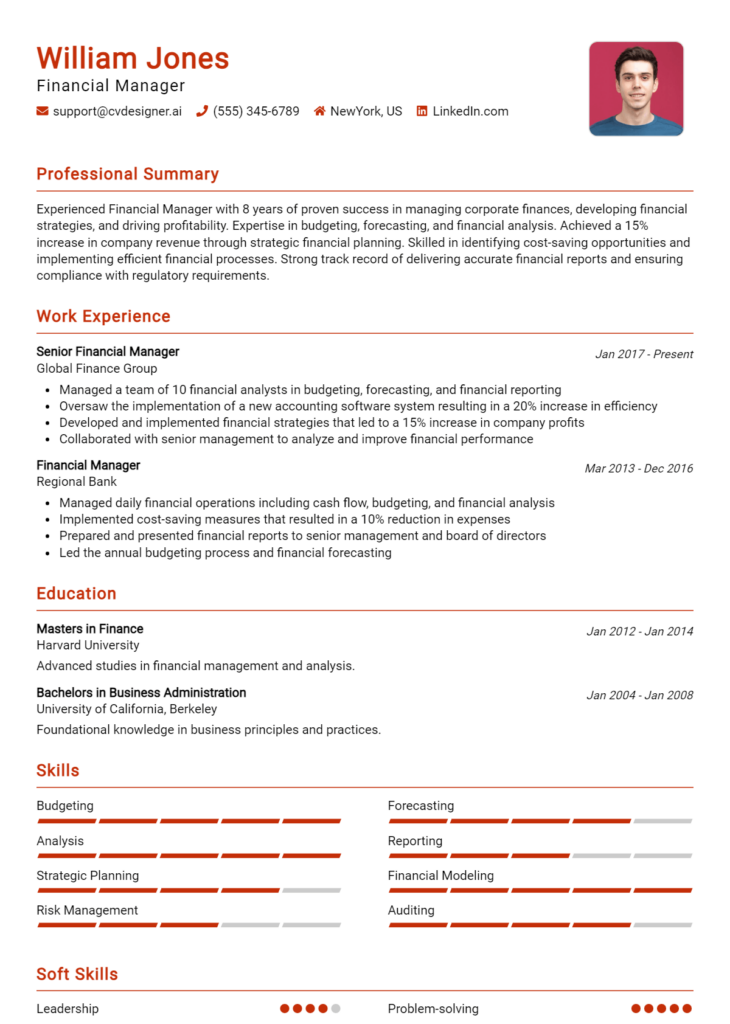Portfolio Manager Core Responsibilities
A Portfolio Manager plays a crucial role in aligning strategic objectives with operational execution, requiring a blend of technical expertise, operational insight, and strong problem-solving skills. They bridge various departments by analyzing performance data, managing budgets, and facilitating communication among stakeholders. This position demands proficiency in financial modeling, risk assessment, and project management, all vital for achieving the organization's goals. A well-structured resume can effectively showcase these qualifications, enhancing career prospects in this competitive field.
Common Responsibilities Listed on Portfolio Manager Resume
- Develop and manage portfolio strategies to align with organizational goals.
- Analyze market trends to inform investment decisions.
- Collaborate with cross-functional teams to ensure project alignment.
- Monitor portfolio performance and implement necessary adjustments.
- Prepare detailed reports for stakeholders on portfolio status.
- Conduct risk assessments and manage risk mitigation strategies.
- Facilitate communication between management and project teams.
- Oversee budget management and resource allocation.
- Evaluate investment opportunities and conduct due diligence.
- Lead project reviews and performance evaluations.
- Implement best practices in portfolio management processes.
- Coach team members on portfolio management methodologies.
High-Level Resume Tips for Portfolio Manager Professionals
In today's competitive job market, a well-crafted resume is essential for Portfolio Manager professionals looking to make a lasting impression. Your resume often serves as the first touchpoint between you and a potential employer, making it crucial to reflect not only your skills and experiences but also your accomplishments in the field. A strong resume can open doors to interviews and ultimately lead to career advancement. This guide will provide practical and actionable tips specifically tailored for Portfolio Manager professionals, helping you to present your strengths in the best possible light.
Top Resume Tips for Portfolio Manager Professionals
- Tailor your resume to match the specific job description, emphasizing keywords and phrases that align with the role.
- Showcase relevant experience in portfolio management, including roles that highlight your ability to manage assets and make investment decisions.
- Quantify your achievements with concrete numbers, such as percentage returns on portfolios or the size of assets managed.
- Highlight industry-specific skills, such as risk assessment, financial modeling, and performance analysis.
- Include relevant certifications, such as the Chartered Financial Analyst (CFA) designation, to demonstrate professional credibility.
- Utilize a clean and professional format that enhances readability, making it easy for hiring managers to navigate your qualifications.
- Incorporate a summary statement that succinctly captures your career highlights and professional goals.
- List any successful projects or initiatives that led to improved portfolio performance or client satisfaction.
- Keep your resume concise, ideally one page, while ensuring it covers all critical information without overwhelming the reader.
By implementing these tips, you can significantly enhance the effectiveness of your resume, increasing your chances of standing out in the competitive field of Portfolio Management. A well-structured and tailored resume not only showcases your qualifications but also demonstrates your commitment to the role, making you a more attractive candidate to potential employers.
Why Resume Headlines & Titles are Important for Portfolio Manager
In the competitive field of portfolio management, a well-crafted resume headline or title is crucial for standing out to hiring managers. A strong headline serves as a powerful first impression, summarizing a candidate's key qualifications and expertise in a single impactful phrase. It should be concise, relevant, and directly aligned with the job being applied for, effectively capturing the essence of what makes the candidate a strong fit for the role. By immediately grabbing attention, a compelling resume headline can set the tone for the rest of the resume, encouraging hiring managers to delve deeper into the applicant's qualifications.
Best Practices for Crafting Resume Headlines for Portfolio Manager
- Keep it concise: Aim for one impactful phrase that encapsulates your qualifications.
- Be role-specific: Tailor the headline to reflect the specific position you are applying for.
- Highlight key strengths: Include your primary skills and accomplishments that are relevant to portfolio management.
- Use industry keywords: Incorporate terminology that resonates with the job description and industry standards.
- Avoid jargon: Ensure the headline is easily understandable to a broad audience, including HR professionals.
- Showcase results: If possible, include quantifiable achievements that demonstrate your success in previous roles.
- Make it engaging: Use action verbs or strong adjectives to create a dynamic impression.
- Revise for clarity: Edit and refine your headline to ensure it communicates your value succinctly.
Example Resume Headlines for Portfolio Manager
Strong Resume Headlines
"Results-Driven Portfolio Manager with Over 10 Years of Success in Asset Growth"
“Strategic Portfolio Manager Specializing in Risk Assessment and Investment Optimization”
“Dynamic Portfolio Manager with Proven Track Record in Maximizing Returns for High-Net-Worth Clients”
Weak Resume Headlines
“Looking for a Job in Finance”
“Experienced Professional”
The strong headlines are effective because they are specific, highlight relevant skills and achievements, and demonstrate the candidate's value proposition clearly. They engage hiring managers by conveying confidence and expertise in portfolio management. Conversely, the weak headlines fail to impress due to their vagueness and lack of relevance; they do not provide any insight into the candidate’s qualifications or suitability for the role, leaving hiring managers uninspired and uninterested.
Writing an Exceptional Portfolio Manager Resume Summary
A resume summary is a crucial component for a Portfolio Manager, as it serves as the first impression a hiring manager will have of a candidate. A strong summary can quickly capture attention by succinctly showcasing key skills, relevant experience, and significant accomplishments that align with the job requirements. It should be concise and impactful, tailored specifically to the position being applied for, allowing candidates to stand out in a competitive job market while highlighting their unique value proposition.
Best Practices for Writing a Portfolio Manager Resume Summary
- Quantify achievements: Use numbers and metrics to demonstrate your impact, such as portfolio growth percentages or asset management success.
- Focus on relevant skills: Highlight skills that are directly applicable to the Portfolio Manager role, such as risk assessment, investment strategy, and client relationship management.
- Tailor the summary: Customize your summary for each job application, reflecting the specific requirements and keywords mentioned in the job description.
- Keep it concise: Aim for 3-5 sentences that clearly convey your strengths without unnecessary detail.
- Showcase industry knowledge: Mention relevant certifications, market trends, or specific sectors you have experience in to establish credibility.
- Emphasize leadership qualities: Highlight experience in leading teams or managing client relationships to demonstrate your ability to oversee portfolios effectively.
- Use action verbs: Start with strong action verbs to convey confidence and decisiveness in your abilities.
- Maintain a professional tone: Ensure the summary reflects a professional demeanor suitable for a financial services environment.
Example Portfolio Manager Resume Summaries
Strong Resume Summaries
Dynamic Portfolio Manager with over 10 years of experience managing diverse asset classes, achieving an average annual return of 12% across a $500 million portfolio. Proven ability to leverage market insights and rigorous analysis to drive strategic investment decisions and maximize client satisfaction.
Results-driven Portfolio Manager with expertise in risk management and investment strategies, successfully increasing portfolio value by 30% within two years while maintaining a 95% client retention rate. Skilled in building and nurturing client relationships and delivering tailored investment solutions.
Accomplished Portfolio Manager with a track record of managing high-net-worth portfolios, achieving a 15% average growth rate. Proficient in utilizing quantitative analysis, enhancing portfolio performance through innovative investment strategies focused on sustainability and ESG principles.
Weak Resume Summaries
Experienced financial professional looking for a position in portfolio management. Strong background in finance and investment.
Portfolio Manager with skills in managing investments and client relations. Seeking to leverage knowledge in a new role.
The examples of strong resume summaries are considered effective because they provide specific achievements and quantifiable results that demonstrate the candidate's impact and relevance to the Portfolio Manager role. They include measurable outcomes and clearly articulate the skills and experiences that align with the job description. In contrast, the weak summaries are vague and lack detail, failing to convey the candidate's unique qualifications or accomplishments, making it difficult for hiring managers to see their potential value.
Work Experience Section for Portfolio Manager Resume
The work experience section of a Portfolio Manager resume plays a pivotal role in demonstrating the candidate's technical skills and leadership capabilities. This section serves as a platform to illustrate not only the ability to manage teams effectively but also the proficiency in delivering high-quality products that meet or exceed expectations. By quantifying achievements and aligning experiences with industry standards, candidates can present compelling evidence of their contributions and successes, setting them apart in a competitive job market.
Best Practices for Portfolio Manager Work Experience
- Highlight relevant technical skills, such as financial modeling, risk assessment, and project management methodologies.
- Quantify achievements with specific metrics, including ROI percentages, project completion times, or budget sizes.
- Showcase collaborative efforts by detailing experiences working with cross-functional teams and stakeholders.
- Use action verbs to convey a sense of initiative and leadership in project management.
- Align work experience descriptions with industry standards and terminologies relevant to portfolio management.
- Include challenges faced and solutions implemented to demonstrate problem-solving abilities.
- Tailor the work experience section to reflect the requirements of the job being applied for.
- Keep descriptions concise and focused on results to maintain the reader's attention.
Example Work Experiences for Portfolio Manager
Strong Experiences
- Led a cross-functional team to deliver a $10M product portfolio, achieving a 25% increase in market share within 12 months.
- Implemented a new risk management framework that reduced project overruns by 30%, saving the company over $500K annually.
- Developed and executed a strategic plan that improved client satisfaction scores by 40%, leading to increased retention rates.
- Managed a diverse team of 10 analysts and developers to launch a financial product that generated $2M in revenue in its first quarter.
Weak Experiences
- Worked on various projects with some success.
- Participated in team meetings and contributed ideas.
- Assisted in managing a few tasks and helped out where needed.
- Had some responsibilities related to project management.
The examples of strong experiences are considered effective because they include specific, quantifiable outcomes that demonstrate the candidate's impact on the organization. These statements reflect leadership, initiative, and a clear alignment with the responsibilities of a Portfolio Manager. In contrast, the weak experiences lack detail and specificity, making them less compelling and failing to showcase the candidate's true capabilities in the field.
Certifications and Education for a Portfolio Manager Resume
When crafting a resume as a Portfolio Manager, it's essential to highlight your educational background and certifications that demonstrate your expertise and commitment to the field. Here are some guidelines on how to effectively list these qualifications:
Certifications to Prioritize
Chartered Financial Analyst (CFA): This globally recognized certification is highly regarded in investment management and demonstrates advanced knowledge in investment analysis, portfolio management, and ethical standards.
Certified Financial Planner (CFP): While the CFP is more focused on personal finance, it provides a solid foundation in financial planning and investment strategies, making it valuable for a Portfolio Manager working with clients.
Financial Risk Manager (FRM): This certification focuses on risk management, which is crucial for portfolio management. It covers topics such as market risk, credit risk, and operational risk.
Chartered Alternative Investment Analyst (CAIA): If your portfolio management role involves alternative investments, this certification is particularly relevant. It provides specialized knowledge about hedge funds, private equity, real estate, and commodities.
Educational Background Examples
Bachelor's Degree in Finance or Economics: A foundational degree in finance or economics is often essential for a Portfolio Manager. It provides the necessary understanding of market dynamics, investment principles, and economic theory.
Master of Business Administration (MBA): An MBA with a concentration in finance or investment management can significantly enhance your qualifications. It demonstrates advanced business acumen and strategic thinking skills, which are critical for effective portfolio management.
Master’s Degree in Financial Engineering or Quantitative Finance: These degrees focus on the mathematical and statistical aspects of financial markets, equipping you with advanced analytical skills that are increasingly valuable in portfolio management.
Bachelor’s or Master’s Degree in Mathematics or Statistics: A strong quantitative background can be beneficial, especially in roles that require data analysis and quantitative modeling for investment decisions.
Formatting Tips
Certifications Section: Clearly label a section titled "Certifications" and list them in reverse chronological order, including the year obtained. You may also include the certifying body for each.
Education Section: Under an "Education" heading, list your degrees in reverse chronological order, specifying the degree earned, major, institution, and graduation year. If you graduated with honors or received any notable accolades, consider including that information as well.
By strategically highlighting these certifications and educational qualifications, you can effectively position yourself as a knowledgeable and skilled candidate for Portfolio Manager roles.
Top Skills & Keywords for Portfolio Manager Resume
As a Portfolio Manager, showcasing the right set of skills on your resume is crucial to demonstrating your ability to effectively manage investments and maximize returns. Skills not only highlight your qualifications but also convey your capacity to analyze market trends, assess risks, and make strategic decisions that align with clients' financial goals. Crafting a resume that emphasizes both hard and soft skills can set you apart from other candidates and provide potential employers with a clear picture of your expertise in the field. A well-balanced skill set enhances your credibility and reflects your readiness to tackle the dynamic challenges of portfolio management.
Top Hard & Soft Skills for Portfolio Manager
Soft Skills
- Strong analytical thinking
- Effective communication
- Leadership and team management
- Problem-solving abilities
- Attention to detail
- Time management
- Emotional intelligence
- Adaptability to change
- Client relationship management
- Strategic thinking
Hard Skills
- Financial modeling
- Risk assessment and management
- Investment analysis
- Portfolio optimization techniques
- Knowledge of financial markets
- Proficiency in investment software (e.g., Bloomberg, Morningstar)
- Quantitative analysis
- Understanding of regulatory requirements
- Asset allocation strategies
- Performance measurement and reporting
For more insights on how to enhance your resume with relevant skills and highlight your work experience, consider tailoring your application to reflect these competencies effectively.
Stand Out with a Winning Portfolio Manager Cover Letter
Dear [Hiring Manager's Name],
I am excited to apply for the Portfolio Manager position at [Company Name], as advertised on [where you found the job listing]. With a robust background in investment management and a proven track record of successfully maximizing portfolio performance, I am eager to bring my expertise in strategic asset allocation and risk management to your esteemed firm. My analytical skills, combined with my ability to build strong client relationships, uniquely position me to contribute effectively to your team.
In my previous role at [Previous Company Name], I managed a diverse portfolio of assets totaling over $500 million. I implemented data-driven strategies and performed in-depth market analysis, resulting in a 15% increase in annual returns over three consecutive years. By leveraging advanced financial modeling techniques and staying abreast of market trends, I was able to make informed investment decisions that mitigated risk while capitalizing on emerging opportunities. My commitment to continuous improvement and innovation in portfolio management aligns well with [Company Name]’s mission to deliver superior investment solutions.
Moreover, I pride myself on my ability to communicate complex financial concepts to clients in a clear and accessible manner. Building long-term relationships has always been a priority for me, and I believe that transparency and trust are essential for successful partnerships. I am particularly drawn to [Company Name] because of your dedication to client satisfaction and your innovative approach to investment strategies. I am excited about the opportunity to contribute to your team and drive value for your clients.
Thank you for considering my application. I look forward to the opportunity to discuss how my skills and experiences align with the goals of [Company Name]. I am eager to bring my passion for portfolio management to your organization and help shape successful investment strategies that meet and exceed client expectations.
Sincerely,
[Your Name]
[Your Contact Information]
[LinkedIn Profile or Professional Website]
Common Mistakes to Avoid in a Portfolio Manager Resume
A well-crafted resume is essential for a Portfolio Manager, as this role demands a unique blend of analytical skills, financial acumen, and strategic thinking. However, many candidates make common mistakes that can undermine their chances of securing an interview. Avoiding these pitfalls can significantly enhance your resume's effectiveness and better showcase your qualifications for the position.
Lack of Quantifiable Achievements: Failing to include specific metrics or results can make your contributions seem less impactful. Use numbers to illustrate success, such as “increased portfolio returns by 15% in one year.”
Generic Summary Statements: Many resumes feature vague summaries that do not convey unique value. Customize your summary to highlight relevant skills and experiences that align with the job description.
Overly Complex Language: Using jargon or overly technical terms can confuse hiring managers. Aim for clear, concise language that effectively communicates your expertise without alienating readers.
Ignoring Keywords: Neglecting to include industry-specific keywords can lead to your resume being overlooked by Applicant Tracking Systems (ATS). Review job descriptions and incorporate relevant terms naturally throughout your resume.
Inconsistent Formatting: A cluttered or inconsistent layout can detract from your professional image. Use a clean, organized format with uniform font styles and sizes to enhance readability.
Too Much Focus on Responsibilities: Listing duties without emphasizing achievements can make your experience appear passive. Highlight accomplishments and the impact of your actions instead of just what you were tasked with.
Neglecting Soft Skills: While technical skills are crucial, overlooking soft skills like leadership and communication can be a mistake. Portfolio Managers often work with teams and clients, so showcasing these abilities is important.
Lengthy Resumes: A lengthy resume can overwhelm hiring managers. Keep your resume concise, ideally one to two pages, focusing on the most relevant experiences and skills.
Conclusion
As a Portfolio Manager, your role is critical in overseeing and managing investments to achieve the desired financial outcomes for clients or organizations. Throughout this article, we have highlighted the essential skills and qualifications that are typically required for this position, including strong analytical abilities, excellent communication skills, and a proven track record in financial markets.
Additionally, we discussed the importance of demonstrating leadership and risk management capabilities, as these are key components of successfully guiding investment strategies. Networking and continuous education were also emphasized as crucial for staying ahead in this dynamic field.
To ensure you stand out in the competitive job market, it is vital to present a polished and professional resume. Take a moment to review your Portfolio Manager Resume, ensuring it reflects your expertise and accomplishments accurately.
To assist you in this process, explore our resume templates, utilize our resume builder, and check out our cover letter templates. These tools can help you create a compelling application that showcases your strengths and aligns with the expectations of potential employers. Don’t wait—take the next step in advancing your career today!

